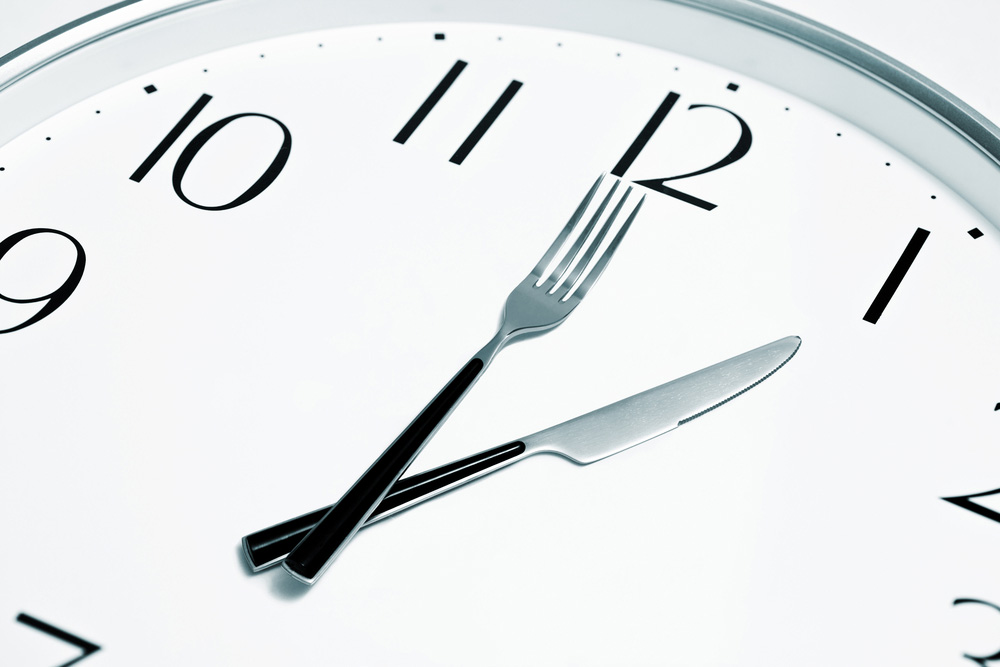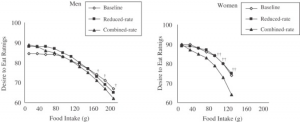While eating dinner in the West Commons I looked at all the other students sitting around me. I noticed that all the smaller students were eating significantly slower than those who were larger. Could the speed they eat at be connected to their weight? I decided to look into this and what I came upon made me slightly alter my question. Does eating slower decrease the amount of food you eat causing you to lose weight? I found an article that discusses how it takes your body twenty minutes to know whether it’s full or not. It goes on to talk about how there are ways of going about this, if you have a difficult time slowing yourself down. Two examples of this are gastric-bypass and a retainer designed by dentists that is put on while eating as to reduce mouth space and decrease your food intake.

I also found an observational experiment, in which participant’s food consumption was tracked and sometimes controlled. Is the connection between weight and rate of food intake directly correlated? Or could the connection be explained by reverse correlation? The volunteers for the study had to meet specific criteria in order to participate. All third party influences that could affect appetite were excluded from the study. None of the 48 participants smoked, had a preexisting medical issue, nor did they take any medications that would have an effect on appetite.

Each participant had a baseline meal in which their average consumption rate of food was tracked. The next time they came for the meal, they were told they would be prompted to eat. Every time they were given an auditory prompt, they were told to eat a piece of the popcorn chicken provided. In this initial observation, they were prompted to eat at the same rate they had eaten the chicken the prior day. This was to get the participant acclimated to the study. The next time they were observed, they were given an audible prompt at a much slower rate than the participant was used to. In the third observation they were prompted at their normal speed and then half way through, at the reduced speed. This displayed a curve in the consumption and was meant to affect the participants hunger. During each of these meals, the participants were told to inform the experimenter when they were full or finished eating.
At the conclusion of the study, the data showed a definitive change caused by the deceleration of the participant’s consumption. The experiment showed that, in both men and women, the desire to eat and the hunger of the participants had decreased. However, it did so more in women than in men. The instructed consumption of the chicken directly affected how hungry they were, and how much they were able to eat before feeling full.
So if eating more slowly causes us to want to eat less, does that mean we’ll lose weight? From this study alone it’s difficult to say. However, it isn’t unreasonable to give it a shot. There’s no reason why it shouldn’t at least have some effect on your weight. We eat every day. Many of us tend to eat much too fast. We always look for round about ways of changing our diets but we never stop and think that maybe the easiest thing to do is just to slow down. What can you take away from all of this? First, if you eat your meals a little slower than usual, you’ll feel less hungry sooner. This will cause you to consume less food each meal. Second, if you eat less food at a slower rate then you’re less likely to feel hungry as the day goes on. Finally, your newly controlled eating habits could have a positive effect on your weight and overall health.
Sources:
http://www.webmd.com/diet/obesity/features/slow-down-you-eat-too-fast#1
http://www.sciencedirect.com/science/article/pii/S0005796707000757
Picture Sources:
http://www.healthmates.com.au/blog/500-for-the-fight-hints-tips/week-10-avoid-weight-loss-plateau
http://www.thenutritionguruandthechef.com/2012/06/19/slow-down-when-you-are-eating/
http://www.sciencedirect.com/science/article/pii/S0005796707000757


This was a very interesting topic. I am someone who is overweight, overeats and eats pretty fast. I thought the conclusion of the study was very interesting. I think it is pretty cool that men consume more food than females but typically lose weight at a high rate than females.
Victor,
I think how you stated off this article was very interesting. I have thought about this topic before but never really looked into it. However, this totally makes so much sense. If you eat slower and less that makes sense that you will loose weight. Also, this reminds me of fasting and not eating somedays. In my jewish religion we have a holiday where we fast and don’t eat for the whole day. This also could help loose weight because your not eating as much or at all. I like how you talked about some of the topics we talked about in class. Do you think this has to do with other factors? Do you think chance plays a role? Here is a article that talked about fasting and how it affects our body and different options for fasting and loosing weight like the eating slower and less.
https://authoritynutrition.com/intermittent-fasting-and-weight-loss/
Victor,
I found your blog post extremely interesting, personally I have always ate too fast to the point where it would give me heartburn. I believe(this is speculation) that it was due to feelings of anxiety, I used to feel that eating was a chore and it should be done quickly but I realized that I never really gave my body proper time to digest the food which in turn really slowed down my metabolism, while I cant say that I gained weight from it I do understand now that eating quickly only causes problems, and anyways food is meant to be savored and enjoyed!
Hey Victor,
I think this topic is really interesting and definitely one that would shift me towards eating slower during meals. I find the results of the study failed to reject the null hypothesis that eating slower does not result in a decreased desire to eat. However, it might be worth highlighting the fact that the women were affected more than men. Perhaps there are some confounding variables to consider?
Overall, great blog post!
Victor, I found this blog post extremely interesting and relevant! I can attest that whenever I eat too fast I do not feel full until about 20-30 minutes later. Whenever, I am less hungry, and so, eat slower I find that I feel the full sensation much faster. I agree that if people ate less food at a slower pace this may ultimately lead to weight loss. I find that in today’s society since people are in a constant rush that everyone binge eats by eating too much too fast. If we all just relaxed and curbed our hunger by eating smaller meals at a slower pace, it may make some significant lifestyle changes! Your graph really enhanced your blog and helped explain the study. Good job!
Victor,
I think it’s interesting that you took such a general observation from the dining hall and managed to back it up with multiple studies and proposals. One thing I thought of when reading this, especially at college, is that the slower you eat, the less time you have before you have to get to class. Therefore, a fast eater will scarf down a lot of food and go to class, while a slow eater will only eat a small amount before it’s time to go. So, in addition to your findings, I think that would be an interesting thing to research. Here is an article that actually looks at the dangers of overeating. These could be beneficial to support your claim!
I think this blog is very interesting because I am someone who overeats because I eat too fast. After eating so quickly I usually do not feel well either. However, as I read your blog a question came into my mind, what if the type of food causes someone to eat faster or slower? For example, if there is a meal full of vegetables on my plate I will probably choke them down which means I will consume them slower, but if there is a tasty piece of pizza on my plate, it will be devoured in seconds. Also, it could be reversed for some people. An example is, if vegetables were on someone else’s plate, they may want to eat them quickly to get it over with, but if there was a piece of pizza they may want to savor it so that it lasts until the very last minute. This difference in personality then leads to the question of why certain people eat differently. I came across an article (aarticle) that talked about moods and personality affecting eating habits and I think it would be cool to check out and compare this to your blog about the pace of eating.
This link did not post correctly so hopefully this time it will work
article